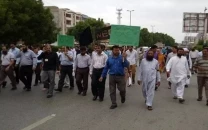In line for justice: Thousands of cases at court still waiting to see the light of day
Legal fraternity highlights the need to increase the number of judges to clear backlog.

Legal fraternity highlights the need to increase the number of judges to clear backlog. PHOTO: FILE
According to statistics, nearly 200,000 cases are pending before the courts in Sindh, out of which 129,423 cases are waiting to be heard in the subordinate courts of the 27 districts - this includes more than 65,000 cases in the five districts of Karachi alone.

Earlier this year, Chief Justice of Pakistan Iftikhar Muhammad Chaudhry had directed the district judges to decide all pending cases filed in years 2010, 2011 and 2012 before March 31 to address the perennial twin-problems of “backlog” and “delays” in the justice system.
But as the incumbent judges struggled to clear the backlog, the government failed to increase their number which resulted in delays in disposal of new cases. According to the lawyers, the judges’ involvement in administrative works in addition to their judicial duties also hindered the quick disposals.

“The problem started when the provincial chief minister, on the recommendations of the high court, conferred special powers on 15 district and sessions judges of the city to hear and decide cases falling under the ambit of the Anti-Terrorism Act 1997 on the directions of the Supreme Court,” an official told The Express Tribune. “This pre-occupied the judges, who were already assigned the task of conducting physical inspections of the government-run schools under the directions issued earlier by the apex court. The election-related duties also consumed a considerable time.”
Shortage of judges
The increase in backlog is mainly said to be due to the shortage of the judges in the high court as well as subordinate courts.
Sindh High Court Bar Association President Mustafa Lakhani said that the shortage was putting an extra burden on the serving judges, who had to entertain at least 100 cases on an average per day individually.
Court officials told The Express Tribune that the judges were seen working till late in the evening and also had to entertain urgent cases in their chambers after the court timing to make sure that “no litigant is deprived of his/her right to get justice.”
Merit-based appointments
Three constitutional petitions, seeking appointment of new judges to the high court, are currently pending with the SHC at Karachi. SHC Chief Justice Mushir Alam on occasions has voiced the need to overcome the shortage by appointing judges only on the basis of their “competency and merit”. Lakhani, however, was of the view that not only new judges should be appointed, but the sanctioned strength of the judiciary should also be enhanced to ensure that the litigants can enjoy the benefits of the National Judicial Policy, which aims to clear the backlog and expedite disposal of cases.
“Speedy disposal [of cases] are not possible if there are not enough judges. Judges should be appointed to the high court as well as the subordinate courts for quick disposal and dispensation of speedy justice,” he said.
The former president of the Karachi Bar Association, Mahmoodul Hassan, said that the only way to deal with the pending cases is to increase number of judges. “Over 200 judges are required to overcome the burden.”
He said that the absence of the judicial complex was among other reasons that contribute to the backlog. “Central Jail should be converted into judicial complex and the jail should be shifted near Razaqabad.”
Increasing workload
The growing pile of cases at the high court includes appeals filed by the convicts of high-profile cases, including the murder cases of US journalist Daniel Pearl and Sarfaraz Shah.
Officials told The Express Tribune that the high court had a backlog of 74,000 pending cases across the province till December 2012. The tireless efforts of the judges managed to bring the number of pending cases down to 9,859 during the last six months at the high court’s principal seat in Karachi and three circuit benches in Hyderabad, Sukkur and Larkana. By end of June, however, the number jumped to 65,298 with the addition of 14,598 new cases, the officials claimed, adding that at least 70 courts - 18 in Karachi - are not functioning for want of judges.
Published in The Express Tribune, August 3rd, 2013.



















COMMENTS
Comments are moderated and generally will be posted if they are on-topic and not abusive.
For more information, please see our Comments FAQ